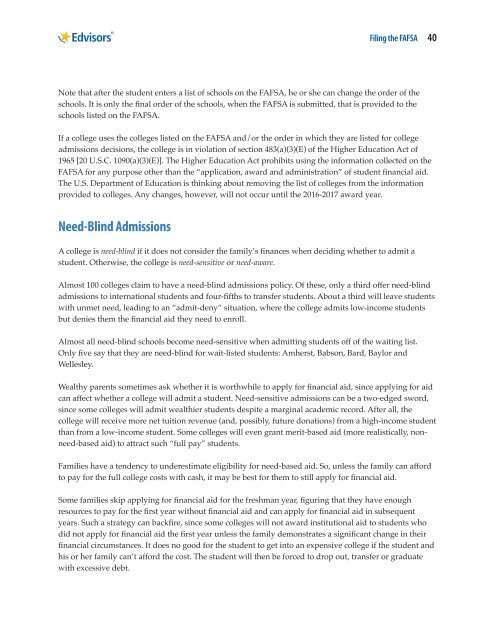filing-the-fafsa-2015-2016-edition
filing-the-fafsa-2015-2016-edition
filing-the-fafsa-2015-2016-edition
Create successful ePaper yourself
Turn your PDF publications into a flip-book with our unique Google optimized e-Paper software.
Filing <strong>the</strong> FAFSA 40<br />
Note that after <strong>the</strong> student enters a list of schools on <strong>the</strong> FAFSA, he or she can change <strong>the</strong> order of <strong>the</strong><br />
schools. It is only <strong>the</strong> final order of <strong>the</strong> schools, when <strong>the</strong> FAFSA is submitted, that is provided to <strong>the</strong><br />
schools listed on <strong>the</strong> FAFSA.<br />
If a college uses <strong>the</strong> colleges listed on <strong>the</strong> FAFSA and/or <strong>the</strong> order in which <strong>the</strong>y are listed for college<br />
admissions decisions, <strong>the</strong> college is in violation of section 483(a)(3)(E) of <strong>the</strong> Higher Education Act of<br />
1965 [20 U.S.C. 1090(a)(3)(E)]. The Higher Education Act prohibits using <strong>the</strong> information collected on <strong>the</strong><br />
FAFSA for any purpose o<strong>the</strong>r than <strong>the</strong> “application, award and administration” of student financial aid.<br />
The U.S. Department of Education is thinking about removing <strong>the</strong> list of colleges from <strong>the</strong> information<br />
provided to colleges. Any changes, however, will not occur until <strong>the</strong> <strong>2016</strong>-2017 award year.<br />
Need-Blind Admissions<br />
A college is need-blind if it does not consider <strong>the</strong> family’s finances when deciding whe<strong>the</strong>r to admit a<br />
student. O<strong>the</strong>rwise, <strong>the</strong> college is need-sensitive or need-aware.<br />
Almost 100 colleges claim to have a need-blind admissions policy. Of <strong>the</strong>se, only a third offer need-blind<br />
admissions to international students and four-fifths to transfer students. About a third will leave students<br />
with unmet need, leading to an “admit-deny” situation, where <strong>the</strong> college admits low-income students<br />
but denies <strong>the</strong>m <strong>the</strong> financial aid <strong>the</strong>y need to enroll.<br />
Almost all need-blind schools become need-sensitive when admitting students off of <strong>the</strong> waiting list.<br />
Only five say that <strong>the</strong>y are need-blind for wait-listed students: Amherst, Babson, Bard, Baylor and<br />
Wellesley.<br />
Wealthy parents sometimes ask whe<strong>the</strong>r it is worthwhile to apply for financial aid, since applying for aid<br />
can affect whe<strong>the</strong>r a college will admit a student. Need-sensitive admissions can be a two-edged sword,<br />
since some colleges will admit wealthier students despite a marginal academic record. After all, <strong>the</strong><br />
college will receive more net tuition revenue (and, possibly, future donations) from a high-income student<br />
than from a low-income student. Some colleges will even grant merit-based aid (more realistically, nonneed-based<br />
aid) to attract such “full pay” students.<br />
Families have a tendency to underestimate eligibility for need-based aid. So, unless <strong>the</strong> family can afford<br />
to pay for <strong>the</strong> full college costs with cash, it may be best for <strong>the</strong>m to still apply for financial aid.<br />
Some families skip applying for financial aid for <strong>the</strong> freshman year, figuring that <strong>the</strong>y have enough<br />
resources to pay for <strong>the</strong> first year without financial aid and can apply for financial aid in subsequent<br />
years. Such a strategy can backfire, since some colleges will not award institutional aid to students who<br />
did not apply for financial aid <strong>the</strong> first year unless <strong>the</strong> family demonstrates a significant change in <strong>the</strong>ir<br />
financial circumstances. It does no good for <strong>the</strong> student to get into an expensive college if <strong>the</strong> student and<br />
his or her family can’t afford <strong>the</strong> cost. The student will <strong>the</strong>n be forced to drop out, transfer or graduate<br />
with excessive debt.


